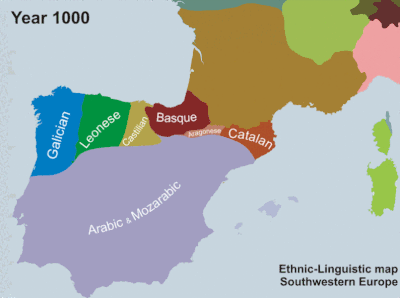Basque language: Difference between revisions
Jump to navigation
Jump to search

George Swan (talk | contribs) ({{subpages}}) |
mNo edit summary |
||
| (3 intermediate revisions by 3 users not shown) | |||
| Line 1: | Line 1: | ||
{{subpages}} | {{subpages}} | ||
[[File:Linguistic map Southwestern Europe-en.gif | thumb | 400px | This animated map shows a gradual shrinkage in the area where the basque language is spoken.]] | [[File:Linguistic map Southwestern Europe-en.gif | thumb | 400px | This animated map shows a gradual shrinkage in the area where the basque language is spoken.]] | ||
The ''' | The '''Basque language''', known to speakers as '''Euskara''', is one of the few non-[[Indo-European languages]] to survive in [[Europe]] to the present day.<ref name=Bbc2015-09-07/><ref name=bbc2017-07-19/> There are no languages related to the Basque language. | ||
Basque people have lived in the Iberian Peninsula and neighbouring regions of what is now France for over 2,000 years. | |||
The ''[[BBC News]]'' reported, in 2017, that 700,000 people speak the basque language. | |||
==References== | ==References== | ||
{{Reflist|refs= | {{Reflist|refs= | ||
<ref name=bbc2017-07-19> | |||
{{cite news | {{cite news | ||
| url = | | url = https://www.bbc.com/travel/article/20170719-the-mysterious-origins-of-europes-oldest-language | ||
| title = | | title = The mysterious origins of Europe’s oldest language | ||
| work = | | work = [[BBC News]] | ||
| author = | | author = | ||
| date = | | date = 2017-07-19 | ||
| page = | | page = | ||
| location = | | location = | ||
| Line 21: | Line 25: | ||
| accessdate = 2022-08-20 | | accessdate = 2022-08-20 | ||
| url-status = live | | url-status = live | ||
| quote = | | quote = Euskara, spoken in the autonomous communities of Navarre in northern Spain and the Basque Country across northern Spain and south-western France, is a mystery: it has no known origin or relation to any other language, an anomaly that has stumped linguistic experts for ages. | ||
}} | }} | ||
</ref> | </ref> | ||
| Line 77: | Line 81: | ||
[https://web.archive.org/web/20220603145609/https://www.bbc.com/news/science-environment-34175224 mirror] | [https://web.archive.org/web/20220603145609/https://www.bbc.com/news/science-environment-34175224 mirror] | ||
</ref> | </ref> | ||
}} | }}[[Category:Suggestion Bot Tag]] | ||
Latest revision as of 16:01, 16 July 2024
The Basque language, known to speakers as Euskara, is one of the few non-Indo-European languages to survive in Europe to the present day.[1][2] There are no languages related to the Basque language.
Basque people have lived in the Iberian Peninsula and neighbouring regions of what is now France for over 2,000 years.
The BBC News reported, in 2017, that 700,000 people speak the basque language.
References
- ↑ Ancient DNA cracks puzzle of Basque origins, BBC News, 2015-09-07. Retrieved on 2022-08-20. mirror
- ↑ The mysterious origins of Europe’s oldest language, BBC News, 2017-07-19. Retrieved on 2022-08-20. “Euskara, spoken in the autonomous communities of Navarre in northern Spain and the Basque Country across northern Spain and south-western France, is a mystery: it has no known origin or relation to any other language, an anomaly that has stumped linguistic experts for ages.”
